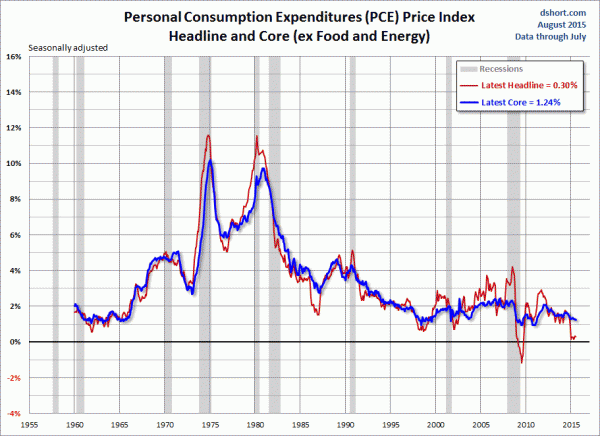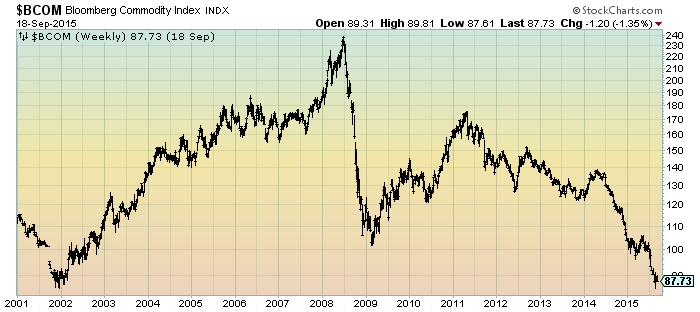This post provides an update to various past posts discussing deflation and “deflationary pressures,” including the most recent post, that of July 27, 2015 titled “U.S. Deflation – July 27, 2015 Update.” I have extensively written of “deflationary pressures” and deflation as I continue to believe that prolonged and deep U.S. deflationary conditions are on the horizon, and that such deflationary conditions will cause, as well as accompany, inordinate economic hardship. [note: to clarify, for purposes of this discussion, when I mention “deflation” I am referring to the CPI going below zero. Also, I have been using the term “deflationary pressures” as a term to describe deflationary manifestations within an environment that is still overall inflationary but heading towards deflation.]
The subject of deflation contains many complex aspects, and as such no short discussion can even begin to be a comprehensive discussion of such. However, in this post I would like to highlight some recent notable developments.
Of note, the shortfall between the Federal Reserve’s stated inflation target (2% on the PCE Price Index) and the actual inflation reading continues. This 2% inflation target has been “missed” (inflation has been less than 2%) for well over 3 years. For reference, here is a chart of the PCE Price Index from Doug Short's post of August 28, 2015, titled "The PCE Price Index Still Below Target":
The issue of inflation continuing to be below the 2% target seems to be receiving more public discussion by the Federal Reserve. Vice Chairman Stanley Fischer gave an August 29, 2015 speech titled "U.S. Inflation Developments" as well as various mentions by Fed Chair Janet Yellen in the September 17, 2015 FOMC Press Conference.
In that Press Conference, one notable comment from Janet Yellen was the following:
Survey-based measures of longer-term inflation expectations have remained stable. However, the Committee has taken note of recent declines in market-based measures of inflation compensation and will continue to monitor inflation developments carefully.
There are many surveys containing inflation expectations as well as "market-based" measures of the same. One survey is the Federal Reserve's September 17, 2015 “Economic Projections of Federal Reserve Board Members and Federal Reserve Bank Presidents, September 2015“ (pdf); another survey can be seen in the September Wall Street Journal Economic Forecast Survey. It should be noted that neither of these surveys shows future PCE or CPI figures below zero.
As well, The University of Michigan's "Inflation Expectations" survey shows stable inflation expectations, and prominent surveys of corporate expectations of inflation, such as the Federal Reserve Bank of Atlanta's Business Inflation Expectations (BIE) are also relatively stable, with the September 2015 survey showing an anticipated 1.7 percent inflation over the next year.
"Market-based" measures of inflation expectations include the Federal Reserve Bank of Atlanta’s series titled “Deflation Probabilities,” which has recently noticeably increased, but still remains low at 5% as of the September 16, 2015 reading.
Another "market-based" measure of inflation is the "10-Year Breakeven Inflation Rate," described in FRED as:
The breakeven inflation rate represents a measure of expected inflation derived from 10-Year Treasury Constant Maturity Securities (http://research.stlouisfed.org/fred2/series/DGS10 ) and 10-Year Treasury Inflation-Indexed Constant Maturity Securities (http://research.stlouisfed.org/fred2/series/DFII10 ). The latest value implies what market participants expect inflation to be in the next 10 years, on average.
Here is the long-term chart, with a reading of 1.58 percent as of September 18, 2015:
source: Federal Reserve Bank of St. Louis, 10-Year Breakeven Inflation Rate [T10YIE], retrieved from FRED, Federal Reserve Bank of St. Louis https://research.stlouisfed.org/fred2/series/T10YIE/, September 21, 2015.
While neither the inflation surveys or "market-based" measures depict a deflationary situation - or provide strong indications of impending deflation - is it correct to assume that they would? For many reasons I don't believe that they will provide significant "advance" warning of impending deflation.
While deflation has many attributes and causes, one of its characteristics is its relative rarity since the beginning of the 20th Century. As I mentioned in the November 14, 2013 post (“Thoughts Concerning Deflation”):
Given that deflationary episodes have been recently relatively nonexistent, “seeing” and “proving” explicit signs of such an impending condition is especially challenging.
I continue to believe that the many continuing signs of “deflationary pressures” is a foreboding. Among these signs is the pronounced weakness in many commodities. One such measure is the Bloomberg Commodity Index, as seen below:
(charts courtesy of StockCharts.com; chart creation and annotation by the author)
Another manifestation of deflationary pressures is seen in U.S. import and export prices.
Still another sign is economic weakness. While there is recent widespread consensus that the U.S. economy is "advancing," if not "strong," my analyses indicates that the economy continues to have many problematical areas of weakness and the widespread consensus concerning current economic vitality is (substantially) incorrect.
In conclusion, I continue to believe that significant (in extent and duration) U.S. deflation is on the horizon. As discussed in the aforementioned November 14, 2013 post, deflation often accompanies financial system distress. My analyses continue to show an exceedingly complex future financial condition in which a very large “financial system crash” will occur, during which outright deflation will both accompany and exacerbate economic and financial conditions.
_____
The Special Note summarizes my overall thoughts about our economic situation
SPX at 1963.80 as this post is written



No comments:
Post a Comment